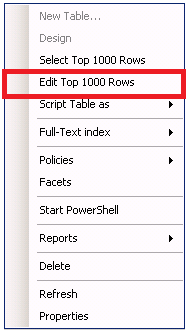Showing posts with label SQL Server Management Studio (SSMS). Show all posts
Showing posts with label SQL Server Management Studio (SSMS). Show all posts
Wednesday, January 08, 2014
SQL Server 2012: SELECT Machine Name, Server Name, Edition, Product Level, Product Version, Licence Type
Description
This post shows how to SELECT property information for a SQL Server.
Solution
The SELECT statement below retrieves Machine Name, Server Name, Edition, Product Level, Product Version, and License Type.
SELECT
SERVERPROPERTY('MACHINENAME') as [Machine Name],
SERVERPROPERTY('SERVERNAME') as [Server Name],
SERVERPROPERTY('EDITION') as [Edition],
SERVERPROPERTY('PRODUCTLEVEL') as [Product Level] ,
SERVERPROPERTY('PRODUCTVERSION') as [Product Version],
SERVERPROPERTY('LICENSETYPE') as [License Type]
The results of the query are shown below.
References
MSDN (2014). SERVERPROPERTY (Transact-SQL). Retrieved January 8, 2014 from http://msdn.microsoft.com/en-us/library/ms174396.aspx
Monday, August 29, 2011
Error: Microsoft SQL Server: Cannot connect to (local)
Description
Error when attempting to log into SQL Server Management Studio: "Cannot connect to (local)."
Solution
As the error message indicates, the SQL Server is not accessible. The issue may be caused by one of the following:
1) Issue with Server Connection Configuration
Start > All Programs > Microsoft SQL Server > Configuration Tools > SQL Server Configuration Manager
Verify the correct protocols are configured (this will vary based on type of environment). Refer to Microsoft TechNet article, Choosing a Network Protocol, for further assistance with this topic.
2) Issue with Service Account Authentication
Start > Administrative Tools > Services
Verify that the SQL Server (MSSQLServer) Service is running. If it is not running, try to start it. Make sure the Service Account credentials are properly configured and that the account is not locked out.
References
Microsoft TechNet (August, 2011). Choosing a Network Protocol. Retrieved August 29, 2011 from http://technet.microsoft.com/en-us/library/ms187892.aspx.
Error when attempting to log into SQL Server Management Studio: "Cannot connect to (local)."
Solution
As the error message indicates, the SQL Server is not accessible. The issue may be caused by one of the following:
1) Issue with Server Connection Configuration
Start > All Programs > Microsoft SQL Server > Configuration Tools > SQL Server Configuration Manager
Verify the correct protocols are configured (this will vary based on type of environment). Refer to Microsoft TechNet article, Choosing a Network Protocol, for further assistance with this topic.
2) Issue with Service Account Authentication
Start > Administrative Tools > Services
Verify that the SQL Server (MSSQLServer) Service is running. If it is not running, try to start it. Make sure the Service Account credentials are properly configured and that the account is not locked out.
References
Microsoft TechNet (August, 2011). Choosing a Network Protocol. Retrieved August 29, 2011 from http://technet.microsoft.com/en-us/library/ms187892.aspx.
Thursday, December 02, 2010
SQL Server 2008: Edit Top 200 Rows
SQL Server 2005 and earlier versions had an Open Table command available when you right-click a table. This allows you to open the table and make edits to fields. In SQL Server 2008, the Open Table command is replaced with the Edit Top Rows command. The default for this is 200, which of course, is obnoxious.
 To change this setting, follow these steps from SQL Server Management Studio (SSMS):
To change this setting, follow these steps from SQL Server Management Studio (SSMS):

After modifying the setting, you will see that the menu is updated accordingly.

 To change this setting, follow these steps from SQL Server Management Studio (SSMS):
To change this setting, follow these steps from SQL Server Management Studio (SSMS):- Tools > Options (This opens the General Scripting Options Dialog Box)
- SQL Server Object Explorer > Commands
- Table and View Options: Value for Edit Top Rows command (Change this value)

After modifying the setting, you will see that the menu is updated accordingly.

Reference
Microsoft (2010). Options (SQL Server Object Explorer/Commands). Retrieved December 2, 2010 from http://msdn.microsoft.com/en-us/library/cc280381.aspx.
Subscribe to:
Posts (Atom)
Events / Conferences / User Groups
- AIIM Conference
- Boston Area SharePoint User Group
- Boston Azure User Group
- Collaborate
- DevConnections
- DevIntersection
- Enterprise Search Summit
- Microsoft Build
- Microsoft SharePoint Conference
- Microsoft TechEd
- New England ASP.NET Professionals User Group
- New England Oracle Applications User Group
- Oracle Applications User Group (OAUG)
- Oracle OpenWorld
- PeopleSoft Government Contractor Special Interest Group
- PeopleSoft Southern New England Users Group
- Quest International Users Group
- SharePoint Saturday
- SPTechCon
- SQL PASS
- SQL Saturday
- Startup Weekend




